Terms used:
Act
The Canada Not-for-Profit Corporations Act S.C. 2009, c.23 including the regulations made pursuant to the Act, and any statute or regulations that may be substituted, as amended from time to time.
Axel
An edge jump with natural rotation that takes off from a forward outside edge; listed in the Scale of Values according to the number of rotations. Unlike other single jumps which are one rotation, a single Axel has one-and-a-half rotations.
Board
The board of Directors of Skate Canada.
Club
A not-for-profit organization that is operating for the general purpose of providing Skate Canada skating programs and is managed by a volunteer board of directors.
Clubs
A not-for-profit organization that is operating for the general purpose of providing Skate Canada skating programs and is managed by a volunteer board of directors.
Events
The name given to a group of skaters entered in a category. There may be one event per category or several events per category depending on the number of total entries. Each event is independent of the other events within the category.
Good Standing
The state or condition of a person who has paid all dues outstanding to Skate Canada, a Club, or a Skating School (as applicable) and whom the Board has not declared not to be in good standing and in the case of Members, a Member whose Membership has not been terminated pursuant to Article 3 hereof [of the bylaws].
International Skating Union
The International Skating Union (ISU) is the exclusive international sport federation recognized by the International Olympic Committee administering the sports of Figure Skating and Speed Skating throughout the world. The ISU is composed of a number of national associations called ISU Members that administer ISU sports at the national level and recognize that all international matters are under the sole jurisdiction and control of the ISU.
Members
Each person that meets the requirements of any of the three Member classes as defined in Article 3 hereof [of the bylaws] and that has been duly admitted as a member of Skate Canada.
Membership
That status of being in one of the classes as outlined in section 3.1 hereof [of the bylaws].
Officer
The President and such other officers as the Board may determine by Ordinary Resolution.
Qualifying Events
A qualifying event is any competition or any event that qualifies skaters to the sectional championships and higher. These include, without limitation, Sectional Championships, Skate Canada Challenge, Synchronized Regional Championships, Canadian Figure Skating Championships and the Canadian Synchronized Skating Championships.
Registration Year
September 1 to August 31 of any given year.
Section
An organization incorporated or organized in a particular province or territory (and in some cases, a combination thereof) strategically aligned with Skate Canada, that may receive funds from provincial or territorial Governmental Authorities and be subject to applicable sport recognition programs and transfer payment arrangements. Each Section is held to the governance and operating requirements of their respective province and / or territory(ies) and is responsible for skating in their respective jurisdictions.
Skate Canada Coach
A skating expert with the required National Coaching Certification Program qualifications to provide a remunerated service at Skate Canada sanctioned clubs and skating schools, both on- and off-ice. These individuals shall have registered, provided full payment and have met all professional coach registration requirements as set annually by Skate Canada.
Skating School
An organization other than a Club that is operating for the general purpose of providing Skate Canada skating programs.
Style
Characteristics of levels of step sequences in ice dance.

Welcome to Skate Canada's Coach Guide, where you can find pertinent information for Skate Canada Coaches.
National Coaching Certification Program
CanSkate Coach
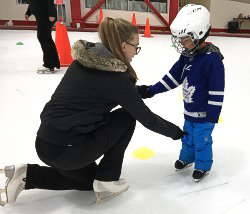

The NCCP CanSkate context prepares coaches to teach skating at the Learn to Skate stage of development as well as deliver the CanSkate program. Coaches are introduced to biomechanics, skill analysis and quality delivery standards. CanSkate Coaches are eligible to coach at the CanSkate level only.
Notice Board: CanSkate Coach Update
Access the NCCP CanSkate Coach Pathway
CanPowerSkate Coach
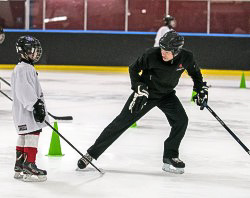
The NCCP CanPowerSkate context prepares coaches to enhance skating skill development at the Learn to Train stage of development for the sports of hockey and ringette. Coaches will also be trained to deliver the CanPowerSkate program. Biomechanics and skill analysis are further developed. Coaches in this context must wear hockey skates and gloves, and bring a hockey or ringette stick to the course.
Access the CanPowerSkate Coach Pathway
Regional Coach
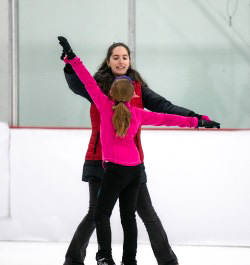
The NCCP Regional Coach context prepares coaches to teach figure skating at the Learn to Train stage of development. Coaches will also be trained to deliver the STAR 1-5 program. Planning is introduced for lessons, sessions and training. Skill corrective exercises are emphasized through exploration of technique, biomechanics and training strategies. Regional Coaches are eligible to coach figure skating at all levels.
Notice Board: Regional Coach Update
Access the NCCP Regional Coach Pathway
Provincial Coach
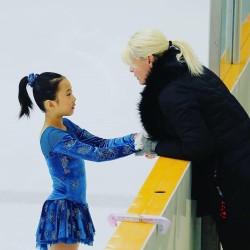
The NCCP Provincial Coach context prepares coaches to further train figure skaters at the Learn to Compete stage of development. Please note that this context is currently under revision and the pathway will be updated in 2020.
Notice Board: Provincial Coach Update
Access the NCCP Provincial Coach Pathway
National Coach
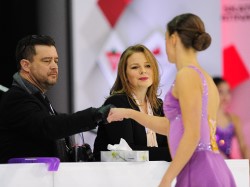
The NCCP National Coach context is designed for coaches working skaters at the Train to Compete through to the Learn/Live to Win stage of development. Emphasis is placed on strategy development and a well rounded coaching skill set.
Access the NCCP National Coach Pathway
Section Course Administrators
Skate Canada Sections are responsible for scheduling NCCP courses. For more information on how to become a coach, contact your Section Course Administrator
British Columbia / Yukon - Courtney Lott - This email address is being protected from spambots. You need JavaScript enabled to view it.
Alberta / NWT / Nunavut - Colleen Yavis - This email address is being protected from spambots. You need JavaScript enabled to view it.
Saskatchewan - Danielle Shaw - This email address is being protected from spambots. You need JavaScript enabled to view it.
Manitoba - Cadfan Edwards - This email address is being protected from spambots. You need JavaScript enabled to view it.
Ontario - Amanda Montgomery - This email address is being protected from spambots. You need JavaScript enabled to view it.
Quebec - Diane Choquet - This email address is being protected from spambots. You need JavaScript enabled to view it.
New Brunswick - Kim MacVey - This email address is being protected from spambots. You need JavaScript enabled to view it.
Nova Scotia - Jill Knowles - This email address is being protected from spambots. You need JavaScript enabled to view it.
Prince Edward Island - Kristen MacDonald - This email address is being protected from spambots. You need JavaScript enabled to view it.
Newfoundland / Labrador - Lori Brett - This email address is being protected from spambots. You need JavaScript enabled to view it.
Provincial/Territorial Coaching Representatives
Alberta: Alberta Sport Connection
British Columbia: viaSport BC
Manitoba: Sport Manitoba
New Brunswick: Coach NB
Newfoundland and Labrador: Sport Newfoundland and Labrador
Nova Scotia: Coach NS
Northwest Territories: Sport North Federation
Nunavut: Sport and Recreation Division Development Officer
Ontario: Coaching Association of Ontario
Prince Edward Island: Sport PEI
Quebec: Sports Quebec
Saskatchewan: Coaches Association of Saskatchewan
Yukon: Sport and Recreation
The Locker
The Locker is the Coaching Association of Canada’s Database which houses NCCP achievements for all coaches in over 60 National Sports. Every coach who has taken NCCP training has their own profile which is unique to their individual NCCP number. As a Skate Canada coach, it is important that you visit your Locker on to ensure proper status is captured. Through the Locker Profile, certified coaches can also track and manage their Maintenance of Certification (Professional Development points)
Accessing your Locker
- Go to Coaching Association of Canada website (coach.ca)
- Go to "The Locker" located top right-hand side
- To login: Enter either your NCCP # or your e-mail address
If you do not have your NCCP # you can access “Lookup my NCCP#”
If you have forgotten your password you can use “Forgot my password”
PLEASE NOTE: If there is an ATTENTION showing in your locker please contact CAC at This email address is being protected from spambots. You need JavaScript enabled to view it. to obtain access to your locker
Description of Headings in the Locker
- Details: This has all your personal information, please ensure that all information is correct and that you indicate that you wish to receive emails from the CAC. The CAC provides many Multi-Sport modules that you can take to obtain PD points.
- Certification:
- Transcripts: Outlines your NCCP achievements
- Maintenance: Outlines the dates of your Maintenance of Certification 3 year cycle as well as the points accumulated.
- Coach Developer: Outlines the pathway to become a Coach Developer. Skate Canada selects coach developers through an application process upon revision of an NCCP program or as needed by a Section.
- Self Report: Where you can self-report Professional Development activities for Maintenance of Certification
Maintenance of Certification
The Coaching Association of Canada (CAC) and Skate Canada recognize the value of having certified NCCP coaches that are engaged in professional development programs which reinforce the values of lifelong learning and sharing among the coaching community. Skate Canada coaches with a NCCP certification are required to obtain professional development (PD) points on a three-year cycle in order to maintain their NCCP status and remain in-good standing with Skate Canada.
Access more information on Maintenance of Certification
Coach Registration and In Good Standing Requirements
Coaches are responsible for maintaining an in good standing status throughout the registration year while actively coaching in Skate Canada clubs or skating schools. Coaches who are not in good standing are not permitted to coach. Coaches are encouraged to utilize their coach dashboard through the Membership Site to monitor these requirements. The following requirements must remain up to date:
- Registered: full payment is required of all registration fees and insurance premiums as determined annually by Skate Canada.
- Valid first aid certificate
- Clear screening through Skate Canada's Back Check
- Have an NCCP status of CanSkate (or CanPowerSkate) In-training or higher
- NCCP certified coaches must maintain their status through Maintenance of Certification
- Completed Skate Canada's Code of Ethics training
- Valid Respect in Sport Activity Leader Training
Access the Professional Coach Membership Procedure
Coach Accreditation Policy for Skate Canada Qualifying Events

Access the Coach Accreditation Policy for Skate Canada Qualifying Events
Ethical Coaching Behaviour and Best Practices
The following resource provides coaches with a guide for expected professional and ethical behaviour in our sport. In skating, coaches will encounter relationships with many stakeholders including, but not limited to:
- Skaters
- Parent/guardians
- Club volunteers
- Coaches/officials
All Skate Canada coaches are responsible for establishing and maintaining ethical coaching behaviour.
Skate Canada Professional Coach membership expectations
- Maintain a registered and “In good standing” status while actively coaching in Skate Canada clubs and skating schools.
Professionalism expected for Skate Canada Coaches
- Accurately represent the NCCP status, professional credentials, education and experience on a resume
- Adhere to the NCCP certification deadlines for CanSkate, Regional, and CanPowerSkate contexts
- Continually seek opportunities for further coach and professional development
- Support and promote Skate Canada, its programs and the sport of skating
- Dress in a neat, clean and professional manner
- Respect the position of other coaches, officials and volunteers
- Ensure all business is conducted and acquired in a professional manner
- Coaches must not directly or indirectly solicit athletes of another coach.
- Be familiar with and conduct oneself in accordance with ISU, Skate Canada, Section and club/school rules, policies, regulations and programs.
- Follow and abide by the Skate Canada Coach Accreditation for Qualifying Events Policy.
- Abide by the Minimum NCCP Status for Coaching
- Actively promote and uphold the “Rule of Two” and Responsible Coaching Movement as identified by the Coaching Association of Canada.
- Responsible for filing all business income to Canada Revenue Agency, annually.
Solicitation & Self Promotion
Coaches must not directly or indirectly solicit athletes of another coach.
Solicitation is defined as: the act of asking for or trying to obtain something from someone.
Direct Example: Coach A approaches the parents of Skater B and criticizes Coach B’s methods. Coach A offers to teach Skater B with the promise of better results.
Indirect Example: Coach A tells Parent A that he/she can help Skater B land their axel and that Coach B had terrible technique and coaching style. Parent A tells Parent B. The next day Skater B switches coaches and hires Coach A.
- Coaches may
- use promotional digital or printed material to advertise and promote their services, qualifications and experience.
- provide further information only when it is requested by an individual.
- Respond to parents/guardians/skaters who approach them and ask questions regarding their services, experience, qualifications, teaching methodology and coaching philosophy.
- Coaches may not
- Approach a parent/guardian/skater and offer their services and or provide their promotional material.
- Go against any procedures or regulations that a club/skating school has around skater recruitment.
Ethical expectations for various relationships
Coach and skater relationships
- Guide and assist skaters in determining realistic goals and objectives in the sport. Avoid making promises or giving guarantees to a skater/team regarding an assessment or competitive achievement.
- Always maintain the best interests of the skater/team. Place the emotional and physical wellbeing of the skater/team ahead of a personal desire to win.
- Respect the influence that a coach can have on a skater/team and never abuse this trust or position of power.
- Coaches must consider their protection in coach and skater relationships (Responsible Coaching Movement). Be mindful of social media connection and interaction outside of the arena.
Coach and parent/guardian relationships
- Establish a coaching contract or agreement with your skaters’ parent/guardian in writing.
- Clearly outline your available coaching services including fees (coaching, assessment, music, competitions, travel/mileage, etc.) and method of payment accepted prior to providing any services as agreed or contracted by the parent/guardian (preferably in written form)
- Work with the parent/guardian and provide information to allow them to make an informed decision about a realistic and affordable course of action for their skater’s development.
- Issue invoices in a professional manner:
- Consistent frequency (weekly, biweekly, monthly, etc.)
- Indicate number of lessons, nature of lessons and fee for each
- Maintain business records of all lessons, invoices and payments
- Establish an effective and agreeable way to communicate
- Ensure to have parent/guardian permission before posting pictures of skaters to social media (personal, club or business).
- Involve the parent/guardian in decisions pertaining to their skater’s development.
- If in a team coaching environment, ensure the parent/guardian is aware and agrees with lessons from all coaching colleagues within the team.
- Respect the fact that a parent/guardian has the right to contract a new coach as a result of a coaching change.
Coach and club/skating school relationships
- Establish and negotiate coaching contracts in good faith and adhere to their terms.
- Be accountable for creating and maintaining a positive and safe skating environment
- Deliver all Skate Canada programs in adherence to the Skate Canada Requirements and Delivery Standards
- Respect the fact that you are contracted by a club or skating school for a specific time period as outlined in your contract/agreement.
- Respect the fact that clubs or skating schools may allow coaches on their ice to conduct professional business as it relates to skater/team development.
- Clubs and skating schools are encouraged to establish a procedure or process for parent education around acquiring coach lessons, as well as a place for coaches to promote their philosophies and qualifications. Processes must be fair to all eligible coaches and must be approved by club/skating school. Some strategies include:
- Providing space on a bulletin board, website, flyer
- Holding a coach information session
- Allowing skaters to “try out” coaches (have a lesson with each coach)
Coach and other skating colleague relationships
- Create and maintain cooperative relationships with coaching colleagues for the purpose of ensuring a positive training environment for the skaters/teams
- Refrain from criticizing other coaches or officials (teaching methods, techniques, opinions, assessments etc).
- Respect the fact that a coach is responsible for the development of a skater/team from the moment that a parent/guardian contracts the services of that coach. Coaching dynamics may vary depending on the situation (base coach, discipline coaches, team of coaches). Only coaches involved should be in contact with the skater/team and parents/guardians.
- In “team coaching” situations all communication must be clear with precise guidelines or parameters for all coaching colleagues within the team.
- If a replacement coach is asked to work with a skater, the previously scheduled coach must outline a clear and precise lesson plan for the replacement coach to follow.
- Respect other coaches’ relationships with their skaters and parents/guardians
- If a coach acquires a skater as a result of a coaching change, the new coach must ensure that all outstanding payment is paid, or payment agreement is in place, to the previous coach(es) and or club(s) of that skater.
- Payment must be paid within reasonable satisfaction of the coach and or club.
- All payment should be paid prior to coaching a new skater.
Dispute Resolution and Complaints
Skate Canada supports the principles of dispute resolution and is committed to the techniques of negotiation, facilitation, mediation and arbitration as effective ways to resolve disputes with and among members.
Depending on the situation, please review the following policies and procedures surrounding complaints and dispute resolution:
Club Dispute Resolution Policy
Section Dispute Resolution Policy
Membership Complaints, Investigations and Hearing Procedures
Coaching Resources
Program Resources
Visit the following guides to assist in the delivery of Skate Canada programs.
Video Resources
Visit our Skating Development Video Library to explore skill standards, coach tutorials and more. Visit our eLearning site to explore workshops, seminars and other modules.

